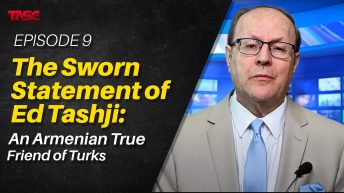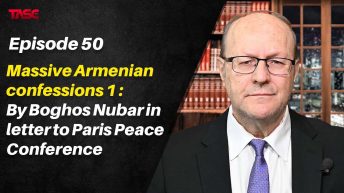n Episode 50, we have seen how Boghos Nubar Pasha, the head of Armenian National Delegation at the Paris Peace Conference, revealed in a letter to the French government in December 3rd 1918, that “…the Armenians have been, since the beginning of the war, ‘de facto belligerents’…as they have fought alongside the Allies on all fronts, enduring… great suffering…” No word about the claim of systematic extermination by the Ottomans. None. Nubar repeated the same confessions in a letter to the editor of The Times of London, which was published on January 30th, 1919, where he wrote that “…the Armenians have been belligerents de facto, since they indignantly refused to side with Turkey…” Again, no word about the claim of systematic extermination by the Ottomans. In Palestine and Syria, Nubar confessed, where the Armenian volunteers, recruited by the Armenian National Delegation at France’s request, made up more than half of the French contingent and played a large role in the victory of General Allenby. Furthermore, in the Caucasus, the 150,000 Armenians in the Imperial Russian Army and more than more than 50,000 of Ottoman-Armenian volunteers contributed to the Ottoman Empire’s loss of a great portion of Eastern Anatolia. While Nubar was writing these facts, he was striving for a place at the Paris Peace Conference table. Little did he know that these lines would amount to an irrefutable Armenian confession that the Armenian suffering was not due to the baseless claim of extermination campaign by the Ottoman government, but due to the treasonable acts of most Ottoman-Armenians as in siding with the invading enemy armies. Here it is, directly from the horse’s mouth. Both letters are readily available on the internet. Those two letters of confession by Nubar sum up why the Ottomans, who were fighting for their survival brutal invasions on five fronts, while also combatting a widespread Armenian insurgency at home, had to move out of the war zones the Armenian rebels and their logistic-base population so that the latter could not resupply and assist the rebels. It was a wartime military measure taken to mitigate a wartime military threat, purely in defense of the Turkish homeland. Another major Armenian confession is that of the first prime minister of Armenia: The Manifesto of Hovannes Katchznouni, translated from the original in Armenian by Matthew A. Callender, edited by John Roy Carlson (Arthur A. Derounian), and published in 1955 by the Armenian Information Service in New York. It is called “The Armenian Revolutionary Federation (Dashnagtzoutiun) Has Nothing To Do Any More. Katchznouni warns that his conclusion may cause general embarrassment, perhaps resentment, in the convention. “At the beginning of the Fall of 1914, when Turkey had not yet entered the war but had already been making preparations, Armenian revolutionary bands began to be formed in Transcaucasia with great enthusiasm and, especially, with much uproar. Contrary to the decision taken during their general meeting at Erzeroum only a few weeks before, the A.R.F. had active participation in the formation of the bands and their future military action against Turkey…The Winter of 1914 and the Spring of 1915 were the periods of greatest enthusiasm and hope for all the Armenians in the Caucasus…. We had no doubt that the war would end with the complete victory of the Allies; Turkey would be defeated and dismembered, and its Armenian population would at last be liberated…We overestimated the ability of the Armenian people, its political and military power, and the extent and importance of the services our people rendered to the Russians. And by overestimating our very modest worth and merit, we were naturally exaggerating our hopes and expectations…The Turks knew what they were doing and have no reason to regret today…” Relocation as a strategy in war has appeared in many forms throughout history. Professor Edward J Erickson makes that point in his book A Global History of Relocation in Counterinsurgency Warfare, by analyzing a representative list of such cases, including the US, the UK, France, Germany, Russia, China, and many others. To select the Ottoman relocation of Armenian insurgents out of the lot, as if with tweezers, distort the facts surrounding it, and attach the false charge of systematic extermination to it, when Armenian leaders themselves confess publicly that the Armenians were de facto belligerents, can only be explained by a blend of Western prejudice, orientalism, ethnic discrimination, religious bias, racist propaganda and Armenian political pressure.
Myths and Realities




Add comment